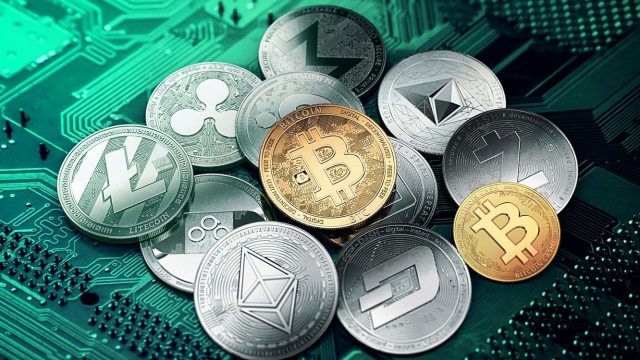Unlocking The Secrets Of Cryptocurrency: A Comprehensive Guide To Coin Mining
Unlocking the Secrets of Cryptocurrency: A Comprehensive Guide to Coin Mining
Cryptocurrency is transforming the financial world, offering a speedier, safer, and more open way to transact. Imagine a currency that cannot be counterfeited and transactions that happen instantly across the globe .
Unlocking the Secrets of Cryptocurrency: A Comprehensive Guide to Coin Mining

The rise of Cryptocurrency has revolutionized the way we think about money and payment systems. With the advent of Bitcoin in 2009, the concept of decentralized and digital currency has become more prominent than ever. One of the key ways in which this decentralized network operates is through a process known as coin mining. In this article, we will delve into the world of coin mining, understanding what it is, how it works, and its importance in the Cryptocurrency ecosystem.
What is Coin Mining?
Coin mining is the process by which new units of a particular cryptocurrency are created and verified through computational power. It is essentially the backbone of the Cryptocurrency network, as it ensures the integrity and security of the entire system. Miners use powerful computers to solve complex mathematical equations, which are used to validate transactions and create new blocks of data.
At its core, coin mining is a form of decentralized verification. Instead of relying on a central authority to validate transactions, the mining process relies on the collective power of a network of miners. This not only ensures the security of the system but also gives the miners the reward of freshly minted cryptocurrency for their efforts.
The History of Coin Mining
The concept of coin mining has been around since the early days of Cryptocurrency. The first cryptocurrency, Bitcoin, was designed to reward miners for their efforts in securing the network. The Bitcoin protocol rewards miners with a small amount of newly minted cryptocurrency for each block of data they help to verify.
In the early days of Cryptocurrency, miners used simple computer hardware to mine for cryptocurrency. However, as the difficulty level of the mathematical equations increased, so did the power of the computers needed to solve them. Today, miners use specialized computer hardware and powerful software to mine for cryptocurrency.
How Coin Mining Works
The process of coin mining involves several key steps:
- Transaction Verification: Miners collect and verify transactions on the network. They ensure that the transactions are valid and that the sender has sufficient funds in their digital wallet.
- Block Creation: Miners create a new block of data that includes a list of verified transactions. This block is added to the existing blockchain of the particular cryptocurrency.
- Mathematical Equations: Miners use powerful computers to solve complex mathematical equations. These equations are used to validate the transactions in the block and create a unique identifier called a "hash."
- Block Verification: Miners verify the block by solving the mathematical equation. They ensure that the hash of the block is correct and that it meets the specific requirements of the cryptocurrency’s protocol.
- Reward: Miners are rewarded with newly minted cryptocurrency for successfully adding a new block to the blockchain.


The Importance of Coin Mining
Coin mining plays a crucial role in the operation of a decentralized cryptocurrency network. Some of its key importance include:
- Security: Coin mining ensures the security of the network by verifying transactions and maintaining the integrity of the blockchain.
- Integrity: Miners help to maintain the integrity of the network by ensuring that all transactions are valid and that the blockchain is updated correctly.
- Decentralization: Coin mining promotes decentralization by giving power to the collective effort of miners rather than a central authority.
- Emerging Technology: The advancement in the tech involved in computer cryptocurrencies is linked with each other as coin mine helps to enhance it together.

The Challenges Facing Coin Mining
Despite its importance, coin mining faces several challenges. Some of the key challenges include:
- Increased Difficulty: The difficulty level of the mathematical equations has increased significantly over the years, making it more challenging for miners to solve them.
- Energy Consumption: Coin mining requires a significant amount of energy to power the computers and machinery needed to mine for cryptocurrency.
- Computing Power: Miners need to invest in powerful computers and specialized hardware to stay competitive in the mining landscape.
- Environmental Impact: The environmental impact of coin mining is becoming increasingly significant due to the high energy consumption.
The Future of Coin Mining
As cryptocurrency continues to grow and evolve, the future of coin mining looks promising. Some of the key trends and developments in the future of coin mining include:
- Increased Scanning: Bitcoin Scanning or mining on Internet 4th G in future for efficiency of Mining
- Improved Efficiency: Advances in technology and mining hardware have led to a significant increase in efficiency for coin mining.
- Decentralized Mining: Decentralized mining platforms are emerging, which give miners more control and flexibility over their mining operations.
- Environmental Sustainability: The cryptocurrency community is shifting towards more environmentally sustainable and energy-efficient methods of mining.
Conclusion
In conclusion, coin mining is a crucial aspect of the Cryptocurrency ecosystem. It ensures the security and integrity of the system, promotes decentralization, and rewards miners with freshly minted cryptocurrency. While it faces several challenges, the future of coin mining looks promising with advancements in technology, improved efficiency, decentralized mining, and a shift towards environmental sustainability. As cryptocurrency continues to grow and evolve, the importance of coin mining will only continue to increase.
Moreover, coin mining is constantly transforming and it can assist us a lot of emerging digital services together with lots of other improvements and challenges.
Post a Comment